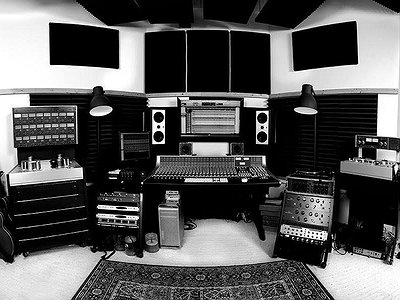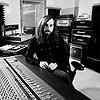Part 2
In how far are the objective, universal and measurable parameters for what constitutes quality in a recording? Do you see producing more as an art or a science?
What I love about it is that it’s both. I’m one of those guys that can happily turn a pot up to “11” or stick a microphone down a toilet. If it sounds good, I go for it. I like the “science” until it starts getting in the way of my vision because “it’s technically wrong”; that’s when science goes out of the window and the “art” takes over. I do however like the fact that I had technical training on the subject and I always try to learn more.
Tell us about your studio, please. What were criteria when setting it up and how does this environment influence the creative process? How important, relatively speaking. are factors like mood, ergonomics, haptics and technology for you?
My studio grew up very slowly over the years. The first album I produced was with a band called “Miasma and the Carrousel of Headless horses” and that was mixed in my bedroom with a laptop and using a pair of Yamaha multimedia speakers. I did a fair bit of work in the field Post Production for video games on a freelance basis, which allowed me to finance more recording equipment. I was working from home until about 2008 when I finally decided to get separate studio premises. The same principle is still going, I’m always buying new gear and improving the studio.
I’m very sensitive to my environment and I think a lot of musicians/artist are too. White, bright lights can make want to stab myself in the face with a blunt knife! I like to feel comfortable because of the amount of hours I spend in studio. I’m very much looking forward to the new studio in the countryside, it’s going to be a massive improvement to be surrounded by fields and trees instead of being trapped at the back of an industrial unit in London. Moods can affect everyone from time to time, but I like to try and leave all that behind the door when I walk into the studio. I also encourage bands to do the same if someone is having a hard time with something not related to what we’re doing, as moods can be contagious!
What were some of the criteria for deciding which tools to get? What are some of the drivers for using particular products – and how will they change your approach?
I tend to hear about equipment from people working in the same field or online. If people are raving about something, I demo the units (digital or analogue). If I like it and I think it works for me I do everything possible to buy it. I also really like vintage equipment and look around for obscure stuff that not many people know or use, sometimes it can be great, sometimes “OK”, but as long as it has a “vibe”, it stays. I just picked up a little electric organ from the street the other day which was missing the mains plug. Took it home fitted a new plug in and it worked. The motor makes a lot of noise and it sounds kind of bad, but I can really see myself using it with certain artists. I also spend a lot of my money on musical instruments and the same principle applies.
The equipment-industry suggests that new equipment keeps making productions better. How much do you believe in the idea of progress in production? What are areas where you feel the need and potential for improvements?
I don’t think new equipment is better than old equipment. All the high-end analogue stuff that was built from the around the 50’s to late 90’s is still some of the best and most sought after. Some of it cannot even be built anymore because techs don’t have the skills, the factories are gone and/or it’s not financially viable for a company to put it on the market.
What has actually improved quite a bit is the computer/digital side of things; effect plugins and digital emulations of analogue gear are actually pretty good these days, though to me, still not up there with their analogue counterparts. Plus they’re missing a big thing for me – the interface. I much prefer using my hands to turn a pot, push a fader or slider than clicking on a mouse.
If anything, the “potential improvements” need to be made by the musicians themselves. Artists have become so used to digital editing, vocal tuning and just literally anything that fixes poor performances. Especially with some commercial/pop music, feel It’s just going from dumb to really fucking stupid.
The line between production work and composition is blurring. In how much do you feel that these two areas could mutually influence and inspire each other?
I agree with you. I think at a musical level a producer is your friend that helps you make your songs’ structures, arrangements and parts the best they can be. It’s also beneficial for bands to have someone with a “fresh ears” involved, particularly if they have been working on their material for a long time. What the producer/engineer has, that a lot musicians don’t, is the technical skill and knowledge of recording equipment which is key to get a fitting sound.
Budgets for productions are being reduced and more and more people are choosing to listen to music in compressed formats and on low-quality playback devices. In which way is this affecting music and how would you rate the state of production today?
Well that’s just the general state of the world these days – everyone wants cheap and cheerful. A lot of music these days is like everything else; it feels plastic-like and cheap. For example, how many metal records have you heard out there with the same drums samples and the same guitar sound? You can achieve that in a laptop. And sure, it sounds “good” if you’re into that kind of stuff. So yeah you could do “ok” stuff on the cheap, which is fair enough since budgets have shrunk exponentially since the arrival of MP3, but I’m always happy to hear interesting productions and band that don’t sound like anything else, like The Mars Volta (RIP) for example. On the other hand I think a lot of people are getting bored of the same sounds and (some) producers/musicians are getting more creative, which what excites me.
It has often been suggested that "the future of music is in live”. How do you feel about the ongoing relevance of recordings as an art form? What can recordings provide what a concert can not?
It’s funny how this has taken a 180 degree flip. Back in the 70’s, 80’s and 90’s bands had to make records to make their money. Now they have to get out there and tour extensively instead. But, a band needs to produce a record in order to tour, so the demand for studios and producers will always be there. It’s just more and more competitive.
There are a lot of us still who enjoy listening to records at home in our hi-fi’s that appreciate sound and production. Going to gigs is great but say, if you really love a song by Foo Fighters, chances are they’re never going to play in your living room, so you’ll have to listen to their records. There are also a few of us, like myself that is not really into going to see “loud” live music.
Also, there has been a rise on vinyl sales and I’ve never seen so many headphones in shops before as we do these days. To me it seems like there’s a growing interest in sound quality and therefore appreciation for the artist’s vision which is normally conveyed in a record.
Do you have a musical vision that you haven't been able to realise for technical or financial reasons – or an idea of what music itself could be beyond its current form?
Not really. Apart from having a massive recording room (which I’m hoping to have sorted the next couple of months) I think I have enough tools to achieve most things I want to do. I think it’s down to creativity and inspiration.
I’m happy with sound waves travelling through air in stereo format. As long as I can listen to music, I’ll be able to “feel it” and appreciate it. To me music is the strongest form of art yet.






